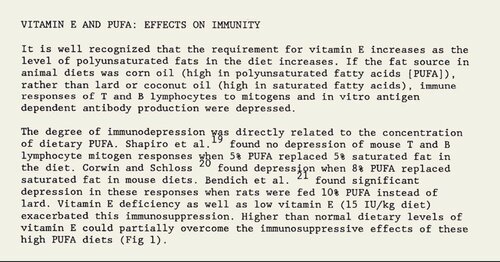ageistheblackestpill
6ft1 manlet in the netherlands
- Joined
- Jan 21, 2020
- Posts
- 266
- Reputation
- 367
Some redpilled quotes from Ray Peat:
The remarkable resistance of “essential fatty acid deficient” animals to shock (Cook, et al., 1981; Li et al., 1990; Autore, et al., 1994) shows that the polyunsaturated fats are centrally involved in the maladaptive reactions of shock. The cellular changes that occur in shock–calcium retention, leakiness, reduced energy production–are seen in aging and the degenerative diseases; the stress hormones and free fatty acids tend to be chronically higher in old age, and an outstanding feature of old age is the reduced ability to tolerate stress and to recover from injuries…
Many older studies found that rats which were deficient in the "essential fatty acids" had the signs of hyperthyroidism, and were in a hyper-metabolic state. The avoidance of oxidatively toxic heavy metals, and the maintenance of respiration, with an absence of the highly peroxidizable unsaturated fats in the diet (and a lower level of them in the storage tissues) would probably make the animals tolerate stress better (EFA deficient mitochondria are more resistant to oxidative injury, and vitamin E prevents many stress-associated problems), and might inhibit the age-related oxidative changes in serum albumin, red blood cells, and other tissues.
When animals are made "deficient" in the polyunsaturated fatty acids, their wounds heal, with normal or accelerated collagen synthesis, and with more vigorous collagen breakdown (parnham, et aI., 1977). Their blood vessels are more resistant, preventing shock that would otherwise be caused by many factors. All phases of development, from gestation to aging, are altered by the presence of the unsaturated fats, and these effects correspond closely to the loss of the regenerative capacity, the ability to replenish and restore tissues
PUFAs are in almost all processed foods (anything with oil that isn't coconut or palm). But you also want to avoid nuts and fish (oil) (this might still be too redpilled for some). You also don't want to overindulge in foods that are "high in saturated fats" such as meat or whole milk, because these foods contain more PUFAs than you might think (they are not nearly as bad as vegetable oils of course).
Some of you might think, ray peat looks as old as he is. This is a valid concern, but don't forget that he only got into this way of eating at 40 or so, and he is not avoiding PUFAs as much as optimal (he still eats eggs, butter and lamb).
The remarkable resistance of “essential fatty acid deficient” animals to shock (Cook, et al., 1981; Li et al., 1990; Autore, et al., 1994) shows that the polyunsaturated fats are centrally involved in the maladaptive reactions of shock. The cellular changes that occur in shock–calcium retention, leakiness, reduced energy production–are seen in aging and the degenerative diseases; the stress hormones and free fatty acids tend to be chronically higher in old age, and an outstanding feature of old age is the reduced ability to tolerate stress and to recover from injuries…
Many older studies found that rats which were deficient in the "essential fatty acids" had the signs of hyperthyroidism, and were in a hyper-metabolic state. The avoidance of oxidatively toxic heavy metals, and the maintenance of respiration, with an absence of the highly peroxidizable unsaturated fats in the diet (and a lower level of them in the storage tissues) would probably make the animals tolerate stress better (EFA deficient mitochondria are more resistant to oxidative injury, and vitamin E prevents many stress-associated problems), and might inhibit the age-related oxidative changes in serum albumin, red blood cells, and other tissues.
When animals are made "deficient" in the polyunsaturated fatty acids, their wounds heal, with normal or accelerated collagen synthesis, and with more vigorous collagen breakdown (parnham, et aI., 1977). Their blood vessels are more resistant, preventing shock that would otherwise be caused by many factors. All phases of development, from gestation to aging, are altered by the presence of the unsaturated fats, and these effects correspond closely to the loss of the regenerative capacity, the ability to replenish and restore tissues
PUFAs are in almost all processed foods (anything with oil that isn't coconut or palm). But you also want to avoid nuts and fish (oil) (this might still be too redpilled for some). You also don't want to overindulge in foods that are "high in saturated fats" such as meat or whole milk, because these foods contain more PUFAs than you might think (they are not nearly as bad as vegetable oils of course).
Some of you might think, ray peat looks as old as he is. This is a valid concern, but don't forget that he only got into this way of eating at 40 or so, and he is not avoiding PUFAs as much as optimal (he still eats eggs, butter and lamb).


